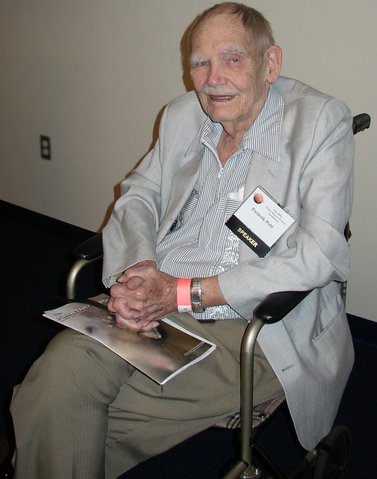
The grand master of science fiction Frederik Pohl (photo ©AllyUnion) died yesterday.
Frederik Pohl was born on November 26, 1919 in New York. He was just a boy when he helped found the group of Futurians along with other prominent figures of science fiction. He also became the literary agent of some of his colleagues.
Frederik Pohl published his first short story, actually a poem, “Elegy to a Dead Satellite: Moon” under the pseudonym Elton Andrews on the magazine “Amazing Stories” in October 1937. In 1939 he became editor of the magazines “Astonishing Stories” and “Super Science Stories”, sometimes publishing his stories under various pseudonyms.
After serving in the U.S. Army during World War II, Frederik Pohl also worked in advertising and as a book editor for “Popular Science”. For a few years he also was a full-time literary agent.
In the ’50s, Frederik Pohl worked closely with his colleague Cyril M. Kornbluth. Their work focused on social science fiction with satire of various types. In 1955 the two writers published their masterpiece, “The Space Merchants”. Their subsequent novels were never at the same level while maintaining a generally good quality: “Search the Sky” (1954), “Gladiator at Law” (1955), “Presidential Year” (1956), and “Wolfbane” (1957).
Unfortunately, on March 21, 1958 Cyril M. Kornbluth had a heart attack and died. Some of his stories were incomplete and were finished by Frederik Pohl. One of these stories, “The Meeting”, published in 1972, won the Hugo Award. In 1981, Pohl also published a new version of the Kornbluth’s novel “Not This August”.
At the end of the ’50s, Frederik Pohl became editor of the magazines “Galaxy” and “If” and won the Hugo Awards for the best professional magazine in 1966, 1967 and 1968. He directed these magazines until 1969. He tried to promote international science fiction also creating the magazine “International Science Fiction” which, however, lasted only from 1967 to 1968.
In the ’50s and ’60s, Frederik Pohl worked with another giant of science fiction, Jack Williamson, writing with him several novels including the Starchild trilogy: “The Reefs of Space” (1964), “Starchild” (1965) and “Rogue Star” (1969).
In the ’70s, after a period in which Frederik Pohl found better quality in his short fiction rather than in his novels, he began the most mature phase of his career. In 1976 he published the novel “Man Plus”, winner of the Nebula Award, but the best came with the Heechee series, which started with “Gateway” (1977), which won the Hugo, Nebula, Locus, and Campbell Memorial awards, and continued with “Beyond the Blue Event Horizon” (1980), “Heechee rendezvous” (1984), “Annals of the Heechee” (1987), the anthology “The Gateway Trip” (1990) and the last novel “The Boy Who Would Live Forever: A Novel of Gateway” (2004).
Frederik Pohl kept on writing novels until a couple of years ago, also finishing “The Last Theorem” in 2008, started by Arthur C. Clarke. His last novel was “All the Lives He Led” (2011).
It would take an entire essay not only to comment on all the works of Frederik Pohl but also to explain his enormous importance in the field of science fiction. He went through various phases of the history of this literary genre always as a protagonist. With his death, the Golden Age is really over.


Permalink
Permalink
Permalink